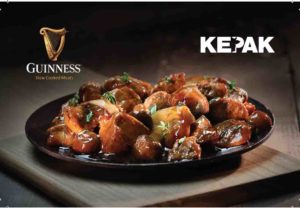Food-led pubs a growing necessity
In tandem with the decline in drinking alcohol, pubs have upped their food offering to compete in the €1 billion on-trade market which Bord Bia believes will continue to grow at 2.5% CAGR between now and 2020.
The pub and the hotel have around 17% each of the €7.8 billion Irish Foodservice market and Bord Bia’s 2017 Irish Foodservice Channel Insights report last November pointed out that the growth in foodservice has mirrored strong increases in employment and economic activity.
Alongside our increasingly robust Irish economy has come the re-emergence of drink-led pubs but “consumers continue to be less likely to visit a pub for ‘drink only occasions’. As a result, the channel continues to see a need for gastropubs and pub menus featuring higher quality, more diverse selections of food”.
As one channel operator quoted in the report, stated, “Pubs are becoming quasi-restaurants and some restaurants are becoming like bars. There’s a blurring of these two segments”.
But Ireland’s chef crisis is impeding this drive towards more gastropub-style dining.
Chef crisis
A shortage of qualified chefs has meant that many rural pubs find it tough to provide the level of food service that they’d like.
VFI Chief Executive Padraig Cribben told Drinks Industry Ireland, “Yes this is a significant issue. More and more pubs are creating a food offering based on the demand for very good quality casual dining from both tourists and domestic market alike. The pub is the natural home for this market. The lack of suitably qualified personnel, particularly chefs, is a significant impediment. If we’re to realise our tourism potential and ensure all customers have a rewarding experience then more resources need to be assigned to training in this area.
“Much work needs to be done at second level, including by the trade, to get hospitality into the minds of students and their parents as a viable and rewarding career. Then we need to have the places available to follow through and give the required level of training. Work that is ongoing in this area needs to be seriously expedited.”
His counterpart in the Licensed Vintners Association agrees, for nor is the city immune.
“We share the hospitality-wide concern about the shortage of skilled kitchen staff and indeed the shortage of good bar staff and we welcome the recent announcement by the Minister for Enterprise to facilitate the recruitment of non-EU chefs to boost the supply of skilled labour for our sector,” LVA Chief Executive Donall O’Keeffe told Drinks Industry Ireland, “Pubs remain the most important channel for out-of-home dining in the country but we’re struggling to attract sufficient skilled kitchen staff to allow us to remain competitive and grow. There’s no doubt that food remains a critical long-term driver of growth in the on-trade and there’s ongoing competitive pressure to raise standards and improve the offering.
“The LVA are actively involved in the Solas Future Skills Group for the Hospitality Sector and our own LVA Diploma in Bar Management focuses heavily on food production, presentation, margin management and management development. That said, there’s no doubt that the State needs to do more to develop food skills and talent for the pub trade and wider hospitality sector.”
To help offset this, Musgrave MarketPlace recently announced a new series of ‘Chef Skills Masterclasses’ in partnership with Ireland’s professional chef community, Chef Network.
The series was launched to help address the current issue of attracting and retaining top culinary talent in Ireland and aims to provide affordable training and increased opportunities for chefs working in the Irish food industry. The first Masterclass was held at Musgrave MarketPlace’s Ballymun Food Emporium with expert Head Development Chef Clement Pavie and Michelin-star chef Danni Barry.
The announcement forms part of Musgrave MarketPlace’s ongoing commitment to supporting and assisting with the professional development of up-and-coming chefs. In addition to its partnership with Chef Network, Musgrave MarketPlace has committed to investing €346,000 over four years with DIT Culinary Arts School.
The Chef Skills Masterclasses are taking place over an eight-month period and examine current food trends and new ways of cooking including root-to-tip/zero waste cooking; Japanese/Asian influences in Irish cuisine; preserving and pantry cooking (fermenting and curing etc); cooking with fish and tips on maximising seasonal Irish produce. Key themes also include menu design, dish costing and profitability.
“The Chef Skills Masterclasses provide a crucial opportunity for chefs in training and for experienced professionals to upskill in key areas,” stated Desi Derby, Marketing Director at Musgrave MarketPlace, speaking about the initiative.
Paul Hayden, Head of Education and Policy at Fáilte Ireland, also welcomed the new masterclass series.
Chef training is vital for the tourism industry, he pointed out, “As the tourism sector has expanded in recent years, the industry has particularly struggled to attract and retain chefs – this has become a major source of concern for many of our industry stakeholders. One of the key influences on tourists’ impression of Ireland is the range and quality of food and how that translates into dining experiences. The quality of training that our chefs receive is vital in this regard.”
Ruth Hegarty, Head of Community at Chef Network, added, “Our core aim is to tackle the skills shortage in today’s Irish food industry and these classes provide a stepping stone in doing so.”
Each masterclass costs €30 with limited spaces available. To find out more or to register for interest, visit www.chefnetwork.ie
UK reflects rise in pub food opportunities
A 15% increase in the number of food-led licensed premises in the UK has been accompanied by a 10.4% decrease in the number of drink-led outlets according to the third edition of CGA’s Future Shock report there, indicating that the tide continues to flow in favour of pub food rather than wet-houses.
Just under half of UK consumers now eat out at least once a week and this is further reflected in the fact that food is responsible for 45.5% of pubs’ and bars’ turnovers there.
A study by the UK Government’s Department for the Environment, Food & Rural Affairs seems to agree with this in stating that 31% of household food & drink expenditure now takes place outside the home.
Tech-savvy suppers
Other surveys on eating out have found that over half of consumers now check an outlet’s website before a visit as can be evidenced by the increasing number of tables being booked online.
Healthy considerations
Healthy lifestyles are an increasingly present consideration in how consumers eat when they do eat out.
While calorie counts might figure in the consumer’s menu considerations, the three catering kitchen ‘undesirables’ – sugar, fat and salt – are said to be important (or very important) factors in the selection of a meal by about half of out-of-home diners there according to the Future Shock report.
It’s worth noting too that it’s been found that those consumers eating out the most often are also those who’re more health-conscious. More than one in three of those who eat out three times a week or more always take healthy options into account and over half say nutritional information is an influence on their choice. In contrast, only 13% of those who eat out less often than once a month take healthy options into account and less than one in three seem influenced by nutritional information.
Kepak partners with Guinness on new food offering for Irish bars

Kepak, Ireland’s leading meat supplier to the foodservice market, has partnered with Guinness to create a new slow-cooked range for the bar and hospitality industry.
Each product is individually sous-vide and portion-controlled. The new products from the exclusive range include:
- Guinness Braised Beef Steak & Onions
- Guinness & Beef Casserole
- BBQ Pulled Pork and Beef
- Lamb Shank in Red Wine & Rosemary
- Pork Belly
- BBQ Pork Ribs
- Jacobs Ladder “The Ultimate Beef Rib”
- Various platter, burger & food solutions.
“This range was specifically developed with the publican in mind and will allow them to offer world-class menu items without the hassle,” explained Bláthnaid Ni Fhátharta, Marketing Director for Kepak Foodservice & Corporate Communications, “In combining the brand pull of Guinness with a range of traditional, favourite dishes, Kepak have produced a unique offering that’s perfect for the licensed trade.”
The range was created after an independent review by Kepak of bars in the greater Dublin area revealed that pub owners believe food to be the second most profitable part of their business. According to Euromonitor International, Mintel, Bord Bia & Technomic, pubs have 17% of the food service market within the Island of Ireland.








